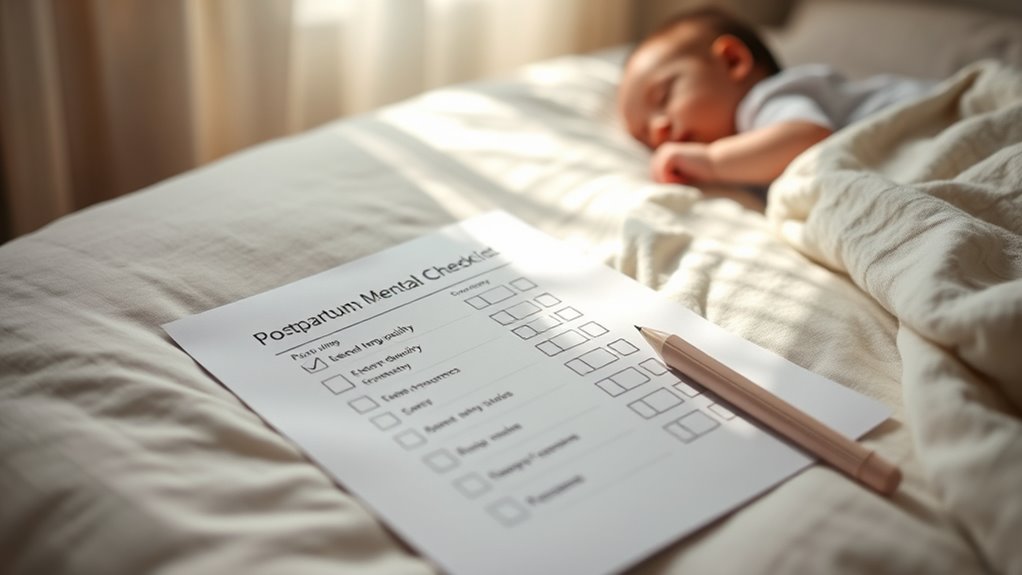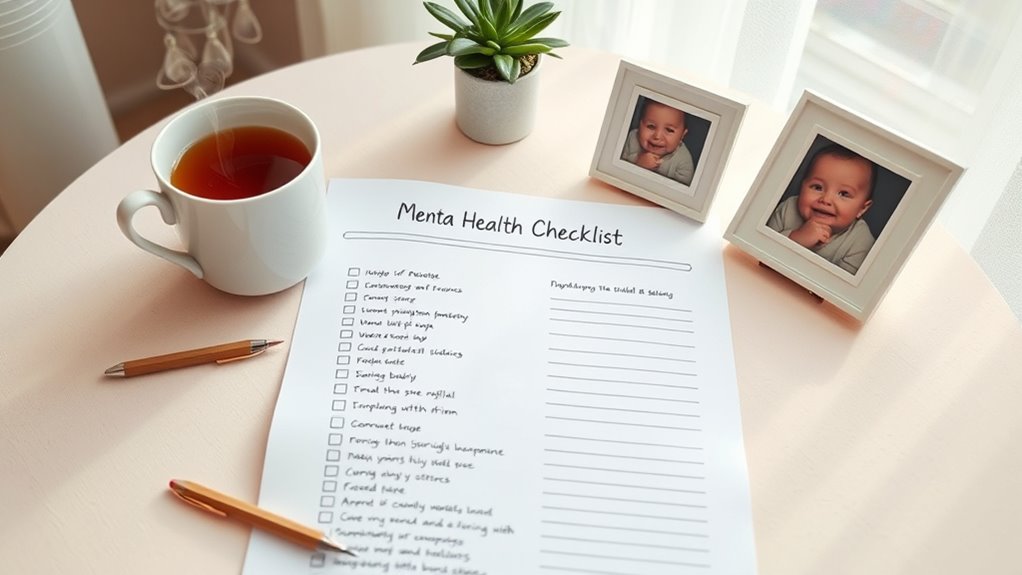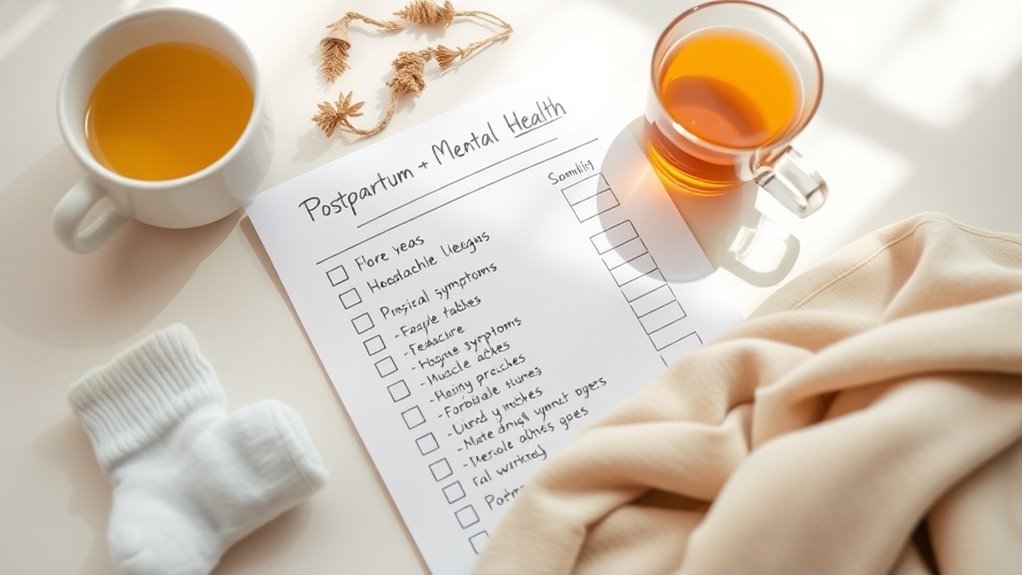A postpartum mental health check-list helps you monitor emotional swings, sleep patterns, and physical symptoms to spot signs of depression or anxiety early. It encourages you to evaluate your support network and plan for professional help if needed. Keeping track of mood, fatigue, and health concerns guarantees you get the support to recover physically and emotionally. If you want to learn how to effectively use this tool, continue exploring key strategies for postpartum well-being.
Key Takeaways
- Monitor mood swings, sadness, irritability, and loss of interest beyond a few weeks postpartum.
- Recognize symptoms of anxiety, panic attacks, and racing thoughts that may indicate mental health concerns.
- Evaluate support systems and schedule regular postpartum visits to discuss emotional and physical well-being.
- Develop a plan to access mental health resources quickly and stay informed about postpartum mental health signs.
- Maintain open communication with healthcare providers, partners, and support networks to ensure ongoing monitoring.
Monitoring Emotional Changes and Mood Swings

Have you noticed any sudden or persistent changes in your mood since giving birth? If so, pay attention to how your emotions fluctuate throughout the day. It’s common to feel overwhelmed, irritable, or tearful, but tracking these feelings helps you understand what’s normal for you. Keep a journal or use an app to note mood swings, noting their frequency and intensity. Notice if certain times of day trigger stronger emotions or if stress levels increase unexpectedly. Recognizing these patterns allows you to stay aware of your emotional state and identify early signs of mental health concerns. Remember, mood swings are common postpartum, but monitoring them helps you seek help if they persist or worsen. Being aware of emotional fluctuations can also help you differentiate between typical changes and signs of more serious conditions like postpartum depression.
Recognizing Signs of Postpartum Depression and Anxiety

While tracking your mood swings can help you understand normal emotional changes postpartum, it’s equally important to recognize when these feelings may indicate something more serious. Postpartum depression and anxiety often present with persistent sadness, hopelessness, or irritability that lasts beyond a few weeks. You might feel overwhelmed, lose interest in your baby or daily activities, or notice changes in appetite and sleep patterns. Anxiety symptoms can include constant worry, panic attacks, racing thoughts, or physical symptoms like rapid heartbeat. If these feelings interfere with your ability to care for yourself or your baby, or if they persist despite support, it’s vital to seek help. Recognizing these signs early allows you to access the support and treatment you need. Additionally, understanding how projector image quality impacts your viewing experience can help you create a more comfortable and enjoyable environment at home.
Tracking Sleep Patterns and Fatigue Levels

Keeping track of your sleep patterns and fatigue levels helps you understand how rest impacts your mood and energy. Pay attention to any disruptions in your sleep, such as waking frequently or trouble falling asleep. Monitoring these changes can guide you in addressing fatigue and prioritizing your well-being. Incorporating consistent routine into your sleep schedule can further improve sleep quality and overall mental health.
Monitoring Rest and Energy
Ever wonder how your sleep and energy levels influence your postpartum recovery? Monitoring your rest and energy helps you understand how you’re healing and adapting. Keep a daily log of your sleep duration and quality, noting any interruptions or difficulty falling asleep. Track your energy levels throughout the day—are you feeling consistently exhausted or gradually regaining strength? Recognizing patterns can reveal when you need more rest or if certain activities drain you more than expected. This awareness empowers you to prioritize sleep, manage fatigue, and adjust your routines accordingly. Staying mindful of your rest and energy levels ensures you’re supporting yourself during this crucial postpartum period. Additionally, understanding how AI-driven health tools can assist in tracking these metrics highlights the importance of AI in healthcare to optimize recovery.
Recognizing Sleep Disruptions
Recognizing sleep disruptions is essential for understanding your postpartum recovery. Pay attention to how often you wake during the night, how long it takes to fall back asleep, and the quality of your rest. Fatigue may feel overwhelming even after a full night’s sleep, signaling underlying issues. Keep a sleep journal to track patterns, noting times you wake and how rested you feel in the morning. Disrupted sleep can affect your mood, concentration, and overall mental health. If you notice frequent awakenings or persistent tiredness, it’s a sign to address these issues with your healthcare provider. Understanding your sleep patterns helps you identify when your body needs extra support and ensures you’re taking steps toward better rest and postpartum well-being. Incorporating sleep analytics can help you gain deeper insights into your sleep quality for more targeted improvements.
Assessing Support Systems and Social Connections

Your support system plays a vital role in your postpartum well-being. Consider how strong your social connections are and whether community resources are accessible to you. Recognizing these factors helps you identify areas where additional support could improve your mental health. Additionally, understanding the importance of social support can be crucial in managing postpartum challenges effectively.
Social Network Strengths
How strong is your social network when it comes to support during postpartum? Think about the people you turn to for help, advice, or just someone to listen. Do you have friends, family members, or partners who regularly check in on you? Are they available when you need a break or a comforting word? Consider how often you connect with them and if their support feels genuine and reliable. A robust social network can provide emotional reassurance, practical assistance, and a sense of belonging. Recognize the qualities that make your support system effective—trust, availability, and understanding. Strengthening these connections can make a significant difference in managing postpartum challenges and maintaining your mental health. Evaluating the support system’s strength can help you identify areas for growth and ensure you have the necessary resources during this important time.
Community Support Availability
A strong social network provides valuable emotional and practical support during postpartum, but evaluating the availability of community resources can reveal gaps that affect your well-being. Check if local support groups, parenting classes, and mental health services are accessible in your area. Consider reaching out to community centers or healthcare providers to learn about available resources. If you feel isolated or overwhelmed, identify whether there are nearby family, friends, or neighbors you can turn to for help. Knowing what support is available helps you plan for times when you need a break or reassurance. Understanding your community’s offerings ensures you don’t miss out on essential assistance that can boost your mental health and ease your postpartum experience. Community support systems play a crucial role in fostering resilience during this challenging time.
Identifying Physical Symptoms and Health Concerns

Recognizing physical symptoms and health concerns is a crucial step in managing postpartum mental health. Pay close attention to your body’s signals—persistent headaches, severe fatigue, or chest pain could indicate underlying health issues needing medical attention. Notice if you experience significant weight changes, abnormal bleeding, or pain during urination or bowel movements. Physical discomforts like ongoing muscle aches or dizziness may also impact your mental well-being. Don’t ignore symptoms that interfere with your daily routine or cause distress. Tracking these signs helps you differentiate between normal postpartum recovery and signs of a health concern. Regular check-ups are essential, but staying aware of your body’s signals empowers you to seek prompt medical care when needed, supporting your overall recovery and mental health stability. Additionally, understanding health-related factors can provide important insights into your postpartum experience.
Planning for Professional Help and Resources

Being aware of physical symptoms helps you understand when your postpartum recovery is progressing as expected or if there might be underlying issues. Planning for professional help guarantees you’re prepared if you need support. Start by researching local healthcare providers, therapists, and support groups specializing in postpartum care. Keep a list of trusted contacts, including your OB-GYN, mental health professionals, and lactation consultants. Schedule appointments early if you anticipate needing help, and don’t hesitate to reach out when symptoms arise. Share your concerns openly with your partner or a trusted person, so they can assist in seeking help if needed. Having a plan in place gives you peace of mind and ensures you’re ready to get support promptly, promoting your healing and well-being. Incorporating mental health resources into your planning can provide additional assistance and guidance during your postpartum recovery.
Frequently Asked Questions
How Soon After Childbirth Should I Start Monitoring My Mental Health?
You should start monitoring your mental health right after childbirth, as feelings can change quickly. Pay attention to signs of overwhelming sadness, anxiety, or mood swings within the first few days and weeks. Keep track of how you’re feeling emotionally and physically. Don’t hesitate to reach out to a healthcare provider if you notice persistent or intense symptoms. Early awareness helps make certain you get the support you need for your well-being.
Can Postpartum Mental Health Issues Occur Even if I Feel Physically Fine?
They say, “Don’t judge a book by its cover,” and that’s true here. Even if you feel physically fine, postpartum mental health issues can still occur. You might not notice feelings of sadness, anxiety, or exhaustion. It’s essential to check in with yourself regularly and seek support if needed. Your mental health is just as important as your physical recovery, so listen to your inner voice.
What Are Some Effective Self-Care Strategies for Postpartum Mental Health?
You want effective self-care strategies for postpartum mental health. Focus on prioritizing sleep whenever possible, as it helps stabilize your mood. Take breaks to relax and reconnect with your needs, whether through gentle walks, meditation, or hobbies. Reach out to loved ones for support, and don’t hesitate to ask for help. Remember, taking care of yourself is essential for your well-being and your baby’s health.
How Can Partners Best Support a New Mother’s Emotional Well-Being?
Think of supporting a new mother like tending a delicate garden—you need patience and constant care. You can help by listening without judgment, offering practical help, and encouraging her to rest. Remember, your encouragement is like sunlight, helping her thrive. Studies show that emotional support reduces postpartum depression risk. Your presence, understanding, and small acts of kindness create a safe space where her well-being can bloom.
Are There Cultural or Societal Factors That Influence Postpartum Mental Health?
You should recognize that cultural and societal factors deeply influence postpartum mental health. For instance, societal expectations about motherhood, stigma around mental health, and cultural norms can shape how women experience and seek help for postpartum issues. Being aware of these influences helps you offer more empathetic support, encouraging open conversations, and reducing stigma. Understanding these factors allows you to create a more supportive environment that respects diverse cultural perspectives.
Conclusion
By using this postpartum mental health checklist, you’ll become a superhero, spotting every mood swing and fatigue like a hawk. Imagine catching those tiny signals of depression or anxiety before they snowball into a mountain of worry. With your support system and professional resources at your fingertips, you’ll be unstoppable—turning the chaos of new motherhood into a well-orchestrated symphony of strength and joy. You’ve got this; you’re more powerful than you realize!









